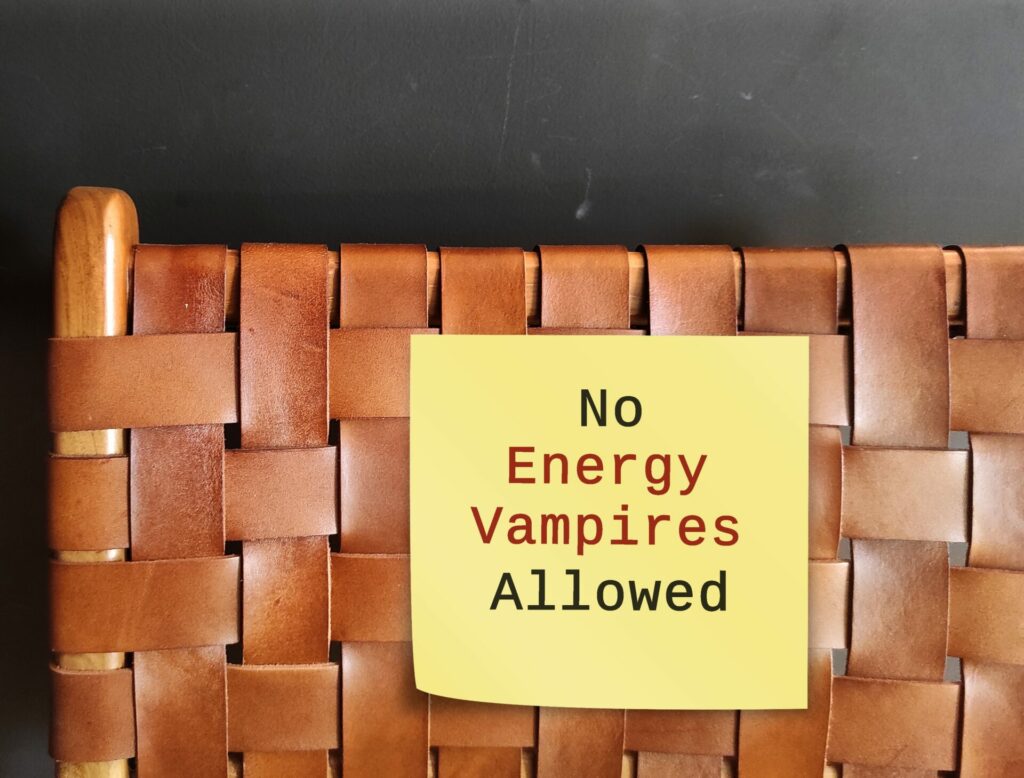Maya’s apartment intercom buzzes and instantly her heart sinks, her pulse quickens and her shoulders tense. She knows exactly who’s at her door: her social vampire friend Celine who always needs someone to listen to her woes.
If Celine isn’t complaining about her husband not emptying the dishwasher, walking the dog and helping the children with their homework, she’s moaning about her in-laws, colleagues, and even the women in her weekly singing group.
‘This has been going on for years,’ reveals Maya. ‘There’s always some drama in her life that she needs to offload onto me. I get all the details over and over, but if I make suggestions or try to reassure her, she ignores me. It’s as if she doesn’t want a solution. She just wants to moan and it’s draining.
‘If I’m out, she waits outside in her car or she phones. Then there are about 30 texts or WhatsApp messages a day. As well as taking up a lot of my time, it’s also getting me down. However upbeat I am, it’s as if her misery is contagious, and she’s dragging me down with her. After listening to her, I feel as if she’s sucked the life right out of me.’
Social Vampire Friends
Maya may not realise it, but Celine is a social vampire. And these people don’t just come out at Halloween with the rest of the ghosts, ghouls and ghastly characters. They’re around all year, in all areas of our lives, making every day feel like October 31st.
‘These so-called friends really are like vampires. They get their teeth into you and they won’t let go. They drain the energy right out of you’
We all know social vampires – the moaning mum at the school gate, who wants you to join her in her complaints against the headteacher; the needy friend who always wants to talk about her love life, but never asks about your other half; the neighbour who bemoans her children going off to university, and the colleague/frenemy who sends you long lists of things you didn’t get 100 per cent right on a project that everyone else said you smashed.
‘These people really are like vampires,’ says Gill Hasson, author of How to Deal with Difficult People (Capstone). ‘They get their teeth into you and they won’t let go. They drain the energy right out of you. They’re needy, demanding and negative. They phone and text you all day and night. They want your time, your energy and your attention. But even when you try to empower them with advice, or inject some positivity or joy into their lives, they don’t want to know.’
Tanya Sibley, a clinical hypnotherapist practitioner, based in Abu Dhabi, explains there are five types of social vampires, so it’s not always easy to recognise them until it’s often too late.
The 5 Types of Social Vampire
‘You might know the victim who can’t take any responsibility for their actions or mistakes,’ says Tanya, owner and founder of Rapid Mind Therapy. ‘They portray themselves as being helpless and guilt-trip you into feeling sorry for them.
‘Next, we have the narcissist. This is someone who constantly wants attention or admiration from others, without ever giving it back. They’re self-important and highly self-absorbed. They seem charismatic but they have little or no empathy.

‘The dramatic vampire is someone who loves creating unnecessary drama and tends to gossip about others to create a reaction. Chaos is exhilarating for them, and they thrive on it.
‘The superior vampire is highly competitive. They put people down in a group setting to boost their own self-esteem.
‘And finally, we have the critical vampire. They prey on your insecurities and manipulate you. They may seem nice on the outside but deep down they will have an underlying malicious intention and they will exploit your kindness.’
So now we can recognise them, how might these vampires affect us?
‘Physically, these vampires can leave you with shoulder problems, headaches, backache and jaw problems, all caused by you tensing up,’ Gill says.
Just as you can catch a cold or virus from someone else, you can pick up other people’s feelings and emotions. They’re infectious. Before you know it, you’re having negative feelings too.’
‘They also exhaust you, not just by airing their moans and groans, but also from the things they ask of you. Many will have you rushing out urgently to the shops for them, driving them to various appointments, picking up their children while they handle a so-called crisis or having them round for coffee because they need someone to chat to about the same old things.
‘Then there’s the anticipation and dread you feel every time your phone pings. You might even berate yourself and start to think you should be a nicer person or be more assertive. Their behaviour can have so many knock-on effects.’
Toxic Behaviour
But some people feel the worst effect is the one this toxic behaviour has on your mood. No matter how joyful you were when you set out to meet your social vampire friend, you can be sure you won’t be as jolly on the way home. Your happiness evaporates, your positivity plummets. You start to see the world as a more dangerous place. Worryingly, you become more like them.
Gill says this is all down to our mirror neurons, which fire when we experience an emotion and when we see others experiencing an emotion such as sadness, anger, pride or happiness.
She explains: ‘Just as you can catch a cold or virus from someone else, you can pick up other people’s feelings and emotions. They’re infectious. We mirror their way of thinking. It can overwhelm you. Before you know it, you’re having negative feelings too.’
But Tanya says not all social vampires are intentionally bad people – many just want to be heard.
‘Most adult behaviour stems from childhood trauma, a feeling of neglect or not getting the right attention as children or young adolescents,’ she says. ‘People who were neglected or deprived as children are more likely to be social vampires as they will strive to get that attention as an adult.
‘One of the biggest human needs is to be connected. This goes all the way back to our tribal days. Social vampires find their connection by conforming to the wrong type of behaviour which can be hurtful, draining and dangerous to others’ wellbeing.’
So, short of showing them the door, how should we handle these social vampires?
Look Forward
If you know you’re going to be spending time with a social vampire, plan a little treat for yourself for afterwards, urges Gill.
‘After you’ve seen them, you might spend half an hour browsing in a book store, pop to a coffee shop, or go to a nice deli to buy some lovely food. It puts you back in control and it’s something positive to look forward to.’
Set Boundaries

The easiest option is not to see or hear from your doom-and- gloom friend, but this isn’t always easy, especially if they’re in your family or you work with them, says Tanya.
‘Choose the right time to meet or chat to these people,’ she advises. ‘Don’t answer their call if you’re not in the right mindset as this will leave you feeling down and exhausted. Deal with them at a time that suits you.’
Play To Your Strengths
If your vampire needs your help, pick the jobs you get involved with, suggests Gill.
‘Rather than going to their home and sitting and listening to them moaning, why not take them to an upbeat film, a concert, the opera or an artist’s open house?’ she says. ‘If your strengths are more practical, you could be the one who drives them to appointments or takes them clothes shopping.’
Change The Subject
If you find your vampire friend is being a drag, change the conversation to something upbeat, suggests Tanya.
‘Keep changing it until they realise they are being negative and that you’re not going to carry on making them feel good about themselves,’ she says. ‘You’ll end up seeing less of them as you won’t be giving them the validation they crave but at least you will have more time and energy for your own family and yourself.’
Look For Positives
Instead of dreading hearing from your social vampire, look at them with a fresh pair of eyes, recommends Gill.
‘Imagine that you’ve never met this person before or how someone else would describe them,’ she says. ‘Think about what they’re good at. They might be great with their grandchildren or with pets, for example. Focus on that. Once you stop seeing them as all bad, you will find things to talk about.’
Do Your research

Educate yourself and try to understand why they are like this, urges Tanya.
‘Sometimes they won’t even realise they’re draining you,’ she says. ‘But if you have compassion as to why they are behaving in this way, it will allow you to put up a shield and not let their negativity in. Understanding more about the way they tick will make you feel better.’
Balance Them Out
If you know you’re going to be putting up with an energy drainer, organise to see more positive people soon afterwards, suggests Gill.
‘Draw up a list of the most uplifting people in your life, and see, phone or message one of them soon after you’ve spent time with your vampire,’ she urges. ‘You might phone a lovely, funny friend for a chat to top up your positivity.’













